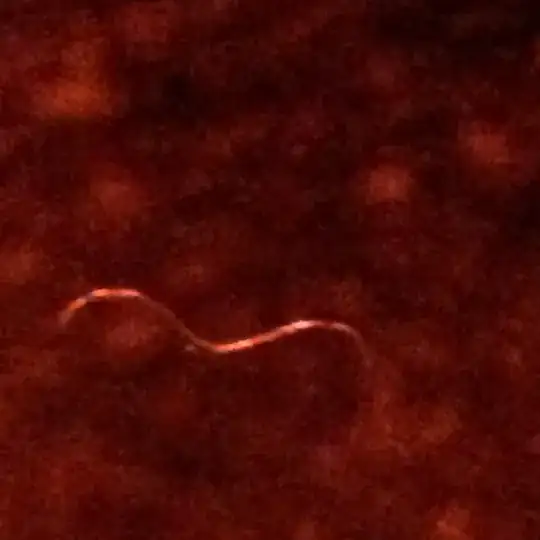Does chronic Lyme disease really exist ? Let me rewrite that question: "Does infection with Borrelia species persist in patients treated aggressively with antibiotics? (Treated beyond the IDSA Guidelines)
Yes, just so you know I recently posted well over 100 references supporting this position on my Facebook page Thomas Grier: and here are some to consider: Dr. Judith Miklossey both photographed Borrelia in the brains of dementia patients 20 years ago, but she cultured Borrelia burgdorferi and used that strain to create a Rat Brain Model of Lyme disease.
Alan MacDonald identified both Bb and Borrelia miyamotoi in the brain of a lumberjack from Twig MN who had been treated aggressively with 7 years of antibiotics. Green is B burgdorferi, Red is B miyamotoi 
Cimmino MA, Azzolini A, Tobia F, Pesce CM. Spirochetes in the spleen of a patient with chronic Lyme disease. Amer J Clin Pathol 1989;91:95-7
Cleveland CP, Dennler PS, Durray PH. Recurrence of Lyme disease presenting as a chest wall mass: Borrelia burgdorferi was present despite five months of IV ceftriaxone 2g, and three months of oral cefixime 400 mg BID. Poster presentation LDF International Conference on Lyme Disease research, Stamford, CT, April 1992 *
Diringer MN, Halperin JJ, Dattwyler RJ. Lyme meningoencephalitis: A report of a severe, penicillin resistant Borrelia encephalitis responding to cefotaxime.
Arthritis and Rheum 1987;30:705-708
Drulle John MD. Persisting Lyme disease: Chronic infection or immune phenomena? Lecture Handout 1992 *
Fried Martin D, Durray P. Gastrointestinal Disease in Children with Persistent Lyme Disease: Spirochetes isolated from the G.I. tract despite antibiotic therapy. 1996 LDF Lyme Conference Boston, MA, Abstract*
Fraser DD, Kong LI, & Miller FW. Molecular detection of persistent Borrelia burgdorferi in a man with dermatomyosistis. Clin and Exp Rheum 1992;10:387-390
Georgilis K, Peacocke M, and Klempner MS. Fibroblasts protect the Lyme Disease spirochete, Borrelia burgdorferi from ceftriaxone in vitro. J. Infect Dis 1992;166:440-444
Hassler D, Riedel K, Zorn J, and Preac-Mursic V. Pulsed high dosed cefotaxime therapy in refractory Lyme Borreliosis (Letter to Editor) Lancet 1991;338:193
Haupl TH, Krause A, Bittig M. Persistence of Borrelia burgdorferi in chronic Lyme Disease: altered immune regulation or evasion into immunologically privileged sites? Abstract 149 Fifth International Conference on Lyme Borreliosis, Arlington, VA, 1992 *
Haupl T, Hahn G, Rittig M, Krause A, Schoerner C, Schonnherr U, Kalden JR and Burmester GR: Persistence of Borrelia burgdorferi in ligamentous tissue from a patient with chronic Lyme Borreliosis. Arthritis and Rheum 1993;36:1621-1626
Lawrence C, Lipton RB, Lowy FD, and Coyle PK. Seronegative Chronic Relapsing Neuroborreliosis. European Neurology. 1995;35(2):113-117
Liegner KB. Lyme Disease: A persistent problem. A Guest editorial JAMA 31(8):1961-63
Liegner KB. Lyme disease: The sensible pursuit of answers (Commentary). J. Clin Microbiol 1993;31:1961-1963
Liegner KB. Spectrum of antibiotic-responsive meningoencephalmyelitides: A fatal case of CMEM. Poster presentation 1992 LDF Lyme Conference, Stamford, CT April 1992 *
Liegner Kenneth B MD. Chronic persistent infection and chronic persistent denial of chronic persistent infection in Lyme Disease. A position paper presented at the 6th Annual International Conference on Lyme Disease and other tick-borne illnesses, Atlantic City, NJ, May 5-6, 1993 *
Preac-Mursic V, Wilske B, Schierz G, et al. Repeated isolation of spirochetes from the cerebrospinal fluid of a patient with meningoradiculitis Bannwarth’ Syndrome.
Eur J Clin Microbiol 1984;3:564-565
Preac-Mursic V, Weber K, Pfister HW, Wilske B, Gross B, Baumann A, and Prokop J. Survival of Borrelia burgdorferi in antibiotically treated patients with Lyme Borreliosis Infection 1989;17:335-339
Schmidli J, Hunzicker T, Moesli P, et al, Cultivation of Bb from joint fluid three months after treatment of facial palsy due to Lyme Borreliosis. J Infect Dis 1988;158:905-906
Waniek C, Prohocnik I, Haufman MA. Rapid progressive frontal type dementia and subcortical degeneration associated with Lyme disease. Poster presentation and abstract presented at the 1993 LDF State of the Art Research Symposia on Lyme Disease, Stanford, CT, April 1993 (212) 960-5872 - NY State Psychiatric Institute *
Wokke JHJ, vanGijn J, Eldersom A, Stanek G. Chronic forms of Borrelia burgdorferi infection of the central nervous system. Neurology 1987;37:1031-1034
